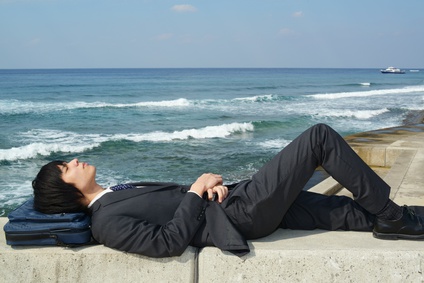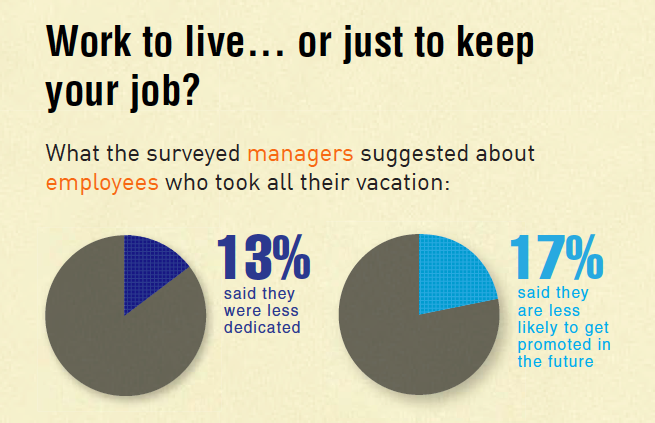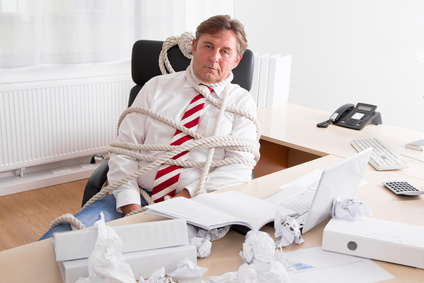
Are certain social norms counterproductive to maintaining a healthy work-life balance? Peer pressure exerts substantial influence in the United States and in American companies. Nearly 17% of managers report that employees who take all their vacation days are less likely to get promoted in the future.
Once a month, my husband has a hell of a week. For five days in a row, he gets up at 3:30am to deliver a detailed report at 7:00am on Eastern European stock markets. Given the earliness of the hour, I never really tried to figure out his exact responsibility in these reports. The point is that instead of working a typical 9-to-7 day, he switches to a 4-to-6. This scheduling makes me crazy, not only because Poor Husband works too much, but also because our family has to be even more sensitive to his fatigue.
Peer pressure at the office
Why doesn’t he leave earlier? His arguments: there’s too much work to do and nobody else who can do it. Additionally, his boss may form a bad opinion of him if he left work before his colleagues. Leave before his colleagues? He starts every day 4 hours earlier than they do, so he should be able to leave before, shouldn’t he? I guess I’m just lucky he comes home at 6:00pm instead of the usual 7:00pm.
Peer pressure on vacation
My husband faces the same tension with his vacation time. His contract allows him 25 paid vacation days a year. But in 2014, he left 9 days unused. He’s not alone. According to a study published in TIME, in 2013 millions of American workers with access to paid time-off left 429 million days of vacation unused.

He belongs to the 61% Americans who say they plan to keep working during their vacation. He’s always loved working and enjoys his current job. But sometimes, it’s too much. Checking emails daily may be okay, but working during vacation crosses the line from dedication to foolishness, in my opinion. Taking time off allows all workers to relax and recharge low personal batteries.
Is peer pressure an American topic only?
“Peer pressure” is one of the terms I learned since living in the States. Is peer pressure among working adults more visible in the States than in France or Germany? I would say no, but French people and Germans don’t live for work alone. Personal or professional achievements are important in France. But family, friends, and quality time are also important.
Let’s return to the work of Hofstede, the Dutch social psychologist. In past blog posts, I’ve already developed some of his points (see “The Challenge of Cross-Cultural Communication” and “How to Navigate the Minefield of Work-Life Balance“). Hofstede identified achievement (termed “Masculinity”) as a relevant cultural dimension. Americans and Germans score high on the achievement scale and are more performance-oriented, while French people prioritize quality of life, albeit not to the level of Sweden and other Scandinavian countries.
My husband is French, but he has always worked for German and American companies with a high performance orientation. This contradicts his French education, which also emphasizes good food and wines, as well as time with family and friends. Although my husband loves his job, his life is not well-balanced.
A senior executive at my husband’s office recently stated in an interview that “we all struggle with how to handle work-life balance” but that he’s “lucky to have a wife who at this stage doesn’t have a job and is willing to take care of everything at home. We took a joint decision for me to come here; she knew what she was getting into. Not everyone is so lucky.”
Maybe he is right about one partner needing to stay home, but maybe not. I am a modern French woman who likes to run her own business while raising three children. When I’m not able to work, I am an awful wife and mother. But I am not Wonder Woman, and even I need time off. Right now, I’m sitting beside the pool in San Diego, watching my family and enjoying every single minute with them.
For additional facts about the work-life balance in the U.S., please download this free infographic.
[sdfile url=”http://www.HowToGuide.org/wp-content/uploads/2015/06/Infographic-Work-Life-Balance.pdf” ]
You might also be interested in reading these articles: Work-Life Balance in the United States or Navigating the Minefield of Work-Life Balance
Foto cre
dit © sunabesyou




Hi Catherine,
Working to feed your partner and children is a different story than working because of peer pressure. Maybe Jean wanted to point out that working can be a challenge and content in a positive way.
In this respect, the pressure is more or less self-made, induced by our society.
I remember a recent research that “burn-out” is a kind of statement that the patient suffers “enough” pressure. In the meantime, burn-out has come a bit out of fashion. It is no longer publicly accepted as the manager syndrome. At least this is a trend in Europe.
Cheers
Ron
Good point if you run your own business. As a latin-american worker, sometimes illegal, if you say no to a job on Saturday or Sunday, you may be not asked again. When we were renovating our house, I talked with some of the guys working there (legal immigrant!), they were not happy to work on Sunday but they felt that they had no choice. Peer pressure is not a topic for executives only.
The trend of a “work-life-ballance” as you describe it has a couple of reasons.
1. We work in a global network, so your 9 til 5 is different than mine.
2. Communication IT allows us to be always on. This results in a change of our behavior: we want to be on; and our communication partners expect us to be on.
3. Mankind is social: we want to take part in the social game and if possible, we want to play a big part.
But things change. We learn go get around with these new requirements. More private life takes place during working hours. Working at home is not only on top of the office hours but replaces a part of the on-site time.
I would estimate that the described situations mainly occur with people of a certain job level.
We have freely chosen this work, this employer and this life. So we constantly deliberate if the benefits of our profession are worth the trade-offs. And with the ever strengthening war for talents, the offerings of an employer concerning real work-life-ballance will increase.
We will be able to shape our professional lifetime more than in the past.
One word concerning expectations: 80 to 90% of the executive managers are fine with a work force that uses their paid vacation to revive or that is not always on.
Cheers
Ron
Thank you for your comment, Ron. I will certainly research if the survey was focused on managers. However, I see every day how handymen work during weekends and until 8pm, how hairdressers do extra hours because tips count for a large share of their income, same with taxi drivers. To have a second or a third job is common in the States, not in Europe.
Very instructive article about different understandings of the concept of happiness. Intangible factors such as quality of life or leisure time of happiness seem to matter less in some countries than others. Since in some societies, time is almost the same as money, the majority needing money is working for it, giving up their vacation time, while the owning minority enjoys leisure time, hiring professionals to manage their assets. Personally, I learnt a lot from traveling around the world to see how people live and make my own opinion about what happiness is about. In the end, working the whole time is ok, when you love what you do.
Sounds like you agree with my husband’s boss!